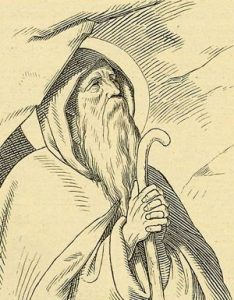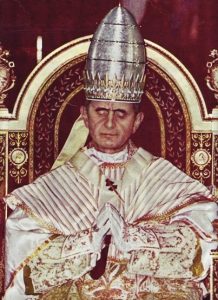 Saint Goar of Aquitaine
Saint Goar of Aquitaine
Priest and Hermit
(+575)
Feast –July 6
Saint Goar was born in the time of Childebert I, son of Clovis, of a noble family in Aquitaine. From his youth he was noted for his earnest piety, and having been raised by his bishop to sacred orders.
His holy conduct and zealous preaching brought many heathen to the knowledge of the true God, many sinners to repentance, and strengthened many pious people to persevere in the righteous path. A large number of people were converted. Wishing to serve God in anonymity, he went into a region where he would be unidentified, and settling in the neighborhood of Trier in Germany, he built a small church and a hermitage, then retired into prayer.
He came forth after a time and began preaching in the area to the pagans, who opened their eyes to the truth of the Gospel. Miracles seconded his teaching; he cured the sick and the lame by prayer and the sign of the cross. Saint Goar reached so eminent a sanctity as to be esteemed the oracle and miracle of the whole country. He practiced hospitality to the poor and to pilgrims, lodging them in his hermitage which he enlarged for that purpose; hospitality is the particular virtue for which he is and was then known. Despite his intention to live in solitude and obscurity, his renown for holiness spread all over the country.
The Almighty permitted the holy man to be accused by some persons of hypocrisy, pride and other vices. Among these were two servants of the bishop of Triers who, after having visited St. Goar and seeing his way of living, said unhesitatingly to the bishop that Goar was a hypocrite who assumed holiness only to deceive the people. The miracles wrought by him, they said, were nothing but deceptions of Satan. The bishop commanded the hypocrite to be brought before him. The servants went to the Saint and informed him of the bishop’s command. St. Goar received them kindly. Next day at day-break the holy man, according to custom, said Mass, and offered breakfast to the servants of the bishop, which they rejected, and reproached the Saint, that he already so early in the morning, thought of eating and drinking. But, notwithstanding this they requested him to give them some food for their journey. The holy man told them that Christianity enjoyed hospitality, and, having given them as much food as they desired for the journey, he went away with them. Upon the way, he occupied himself in singing Psalms. At midday the servants were faint from hunger and thirst, and unable to proceed on their journey, they wished to refresh themselves with the food which the holy man had given to them, and they looked about for some water wherewith to quench their thirst. But they found neither food nor water: God had taken from them for the wickedness with which they had judged the holy priest. They acknowledged their fault, and begged the saint’s pardon, who after a short prayer produced them by miracle, food and drink. Recognizing the holiness of him whom they had denounced a hypocrite and a glutton they changed their opinion of him and arriving at the bishop’s palace, told what had occurred and added much in the Saint’s praise. When Saint Goar entered the episcopal palace, he mistook a ray of sunshine for a coat hook and suspended his cloak upon it. The bishop, however was not so willing to alter the opinion he had already formed, but accused him, in the presence of great many priests of several vices, particularly of hypocrisy and intemperance. The Saint defended his innocence with great sweetness and tranquility, but found no willing ear in the bishop. Meanwhile an illegitimate child was brought in, which had just been found at the place where such children were deposited. The bishop said to the assemblage;” We shall now see if this hermit is a true servant of God, or only deceiver.” He then commanded the accused to reveal the name of the parents of the child, or induce the latter to name them. The holy man refused as long as possible to comply with this request, and gave reasons which ought to have induced the bishop to let the matter rest; but, as he insisted upon it, the Saint adjured the child in the name of the Holy Trinity to reveal the names of its parents. The child which was only three days old immediately opened its mouth, and said quite distinctly: “Rusticus is my father, and Flavia, my mother.” The bishop was thunderstruck at hearing his own name, and falling at the feet of St. Goar, begged him to forgive the rash judgment he had formed of him. The holy man was deeply grieved that this crime was thus made public, and took upon himself to make reparation for it by a penance of seven years.
This remarkable event soon spread abroad, and when it had come to the ears of King Siegbert, the Saint was called to inform the King of the whole proceedings. The holy man, however, refused to appear. The King insisted, saying that he was already acquainted with the principal facts, and having related them, desired to know if all had happened in that manner. The Saint replied: “As your majesty has related all, it would be superfluous to add anything.” This answer pleased the King greatly, who therefore desired to bestow on St Goar the See of Triers. The Saint earnestly refused, but as the King, the nobility, and the people urged him to accept it. He requested to have a few days, to take counsel with God. When this had been granted, he returned to his dwellings, and prayed, with tearful eyes, that God would avert what seemed to be in store for him. God heard his prayer, and sent him a dangerous fever, which kept him for seven years in his cell, not allowing him to set foot out of doors. These seven years of suffering he offered according to his promise to God, for the bishop, who then also led a penitential life. Hardly had the Saint recovered from his illness, when the King again requested him to accept the government of the See. But the Saint answered that they would not be able to remove him out of his cell, until they carried away his body in a coffin. These words proved true, for he was attacked by another disease which lasted four years, and which only terminated at his death, in the year of our Lord 575.
The many miracles wrought on the tomb of the Saint showed how much the Almighty was pleased with His servant, while they at the same time made the place, where his holy relicts rested, so famous, that near Coblentz in Germany a considerable town grew out of it which still at this day bears the name of “St. Goar”.
[1] “Saint Goar – Lives of the Saints,” Magnificat, 24 February 2016. [Online]. Available: http://sanctoral.com/en/saints/saint_goar.html. [Accessed 6 July 2017].
[2] “Goar of Aquitaine,” Wikipedia, [Online]. Available: https://en.wikipedia.org/wiki/Goar_of_Aquitaine. [Accessed 6 July 2017].
[3] F. X. Weninger, Lives of the Saints, New York: P. O’Shea, 1877.

 Satan and Sin
Satan and Sin